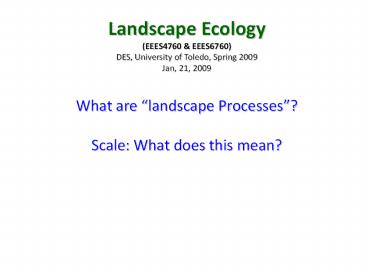Landscape Ecology - PowerPoint PPT Presentation
1 / 24
Title: Landscape Ecology
1
Landscape Ecology (EEES4760 EEES6760) DES,
University of Toledo, Spring 2009 Jan, 21,
2009 What are landscape Processes? Scale
What does this mean?
2
(No Transcript)
3
Natural and manmade river ecosystems, showing the
direct influences of human disturbances. The
movement and dispersals of materials, energy, and
species are clearly different.
4
Movement of glacier directly affects the
geomorphology of the mountain and down stream
ecosystems.
5
Movement of species across the landscape. GPS
and radio collar applied to tract their spatial
locations.
6
Fire in S. portion of the Washburn
7
http//www.jdlphotos.com/galleryone.htm
- Butterfly movement and edge configuration in S.
Africa. - Lightening in New Mexico was found to related to
vegetation patches, likely via soil moisture
patterns
8
NEP Changes
Changes in NEP with age (a) and the age structure
of a hypothetical landscape (b), which determine
the cumulative NEP of the landscape ( C ).
9
Visualization of a landscape in N. Wisconsin from
1972 to 2001
38858.13ha (96020.19ac)
10
..model estimates that take into account both
greenhouse gases and sulphate aerosols are
consistent with observations over this period
SPM
Stott et al, Science 2000
Credit Dr. Steve McNulty
11
Climate change versus land-use?
The effects of intensive forest management and
agricultural abandonment on carbon uptake in the
United States are probably as large or larger
than the effects of climate and CO2. -Schimel
et al., 2000, Science
12
(No Transcript)
13
If you could perceive the patterns in a scene,
you could then look beyond the patterns to the
underlying structure that supports them. If you
could see and grasp the methods by which a
surface harmony had been achieved, you eventually
could understand the deepest meaning and
mechanisms of any subject and then make a good
painting of it (Page 66) Koontz 1980
Whispers
14
Understanding a landscape
15
Understanding a landscape
Are we satisfied with this product?
16
Understanding a landscape
Is this structure of the landscape interesting
and how was it created?
17
Understanding a landscape
Is this structure of the landscape interesting
and how was it created?
18
Understanding a landscape
Chen Saunders 2006
19
(No Transcript)
20
Selected Topics Structure patterns,
heterogeneity, homogeneity Process species
movement, disturbances, flows of water and
nutrients Dynamics land use and land
change Scaling theoretical and
empirical Linking ecosystem processes carbon
and water flows Quantitative techniques RS,
GIS, spatial stats Planning and design
landscaping, archeology, paleoecology,
etc. Natural resource management forestry,
agroforrestry, etc.
21
Once upon a time, there
Key Points
- Structure needs to be defined by objective,
proper scale, and variable of interests - All structural elements are dynamic (i.e.,
constantly changing over time)
22
In general, the scales of structures/patterns we
see and scales of the processes that create or
maintain them are positively correlated but this
is not always the case. Scale is characterized by
both grain (i.e., resolution) and extent
Grain smallest unit of measure about which one
has information Extent Total area (or
duration of time) over which we are considering a
phenomenon
23
(No Transcript)
24
Questions?

